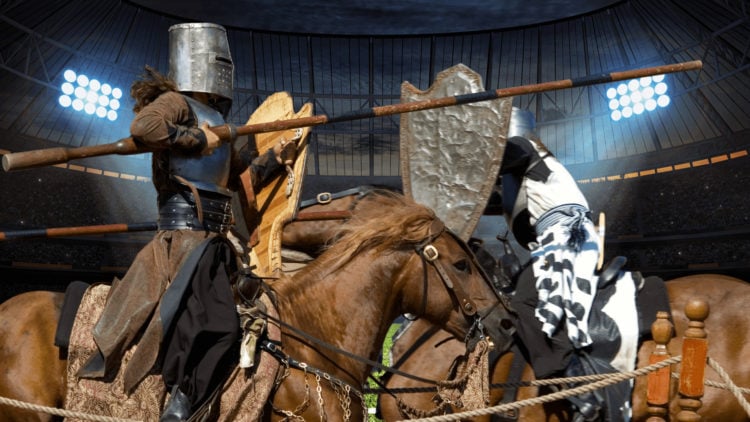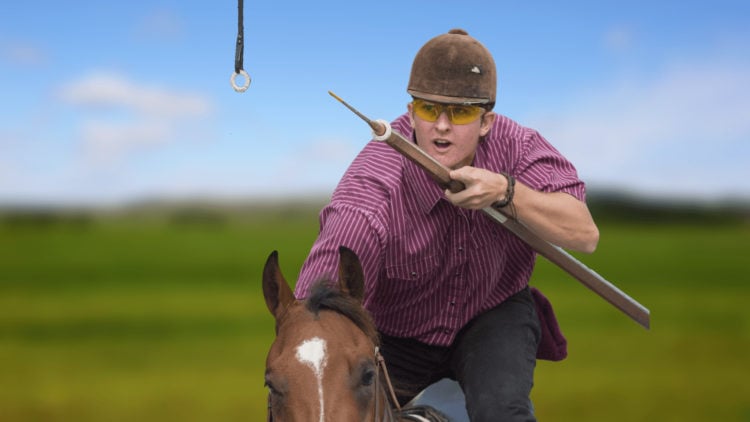
OBJECTIVE OF JOUSTING: Score more points than the opponent by either knocking them off their horse or breaking the lance by making solid contact with the opponent’s armor.
NUMBER OF PLAYERS: 2 players
MATERIALS: Lance, horse, shield, and a full suit of armor per player
TYPE OF GAME: Sport
AUDIENCE: 8+
OVERVIEW OF JOUSTING
Jousting is a medieval-era sport that pits two horseback riders – equipped in a full suit of knightly armor and wielding a ten-foot lance – against each other on a narrow field known as “the lists.” Reminiscent of a 15th-century heavy cavalry engagement, this game is still played in modern times and is even considered the state sport of Maryland.
SETUP
TRADITIONAL
A traditional knight-versus-knight joust is performed on a flat field often referred to as “the lists.” This field, which can range from 110-220 feet in length, a long fence is usually fitted in the middle spanning its length known as a “tilt rail.”
Both riders line up on opposite sides of the tilt rail.
RING JOUSTING
In ring jousting, there are three arches, each holding one ring above the ground. The track is 80 yards long, 20 yards before the first arch, 30 yards before the second arch, and another 30 yards before the last arch.
GAMEPLAY
There are two types of jousting in modern times with slightly differing rules: traditional and ring jousting.
TRADITIONAL JOUSTING

A traditional jousting game consists of three rounds of two opposing knights charging at each other on horseback. The objective of the joust can vary, with most medieval-era jousts looking for a rider to knock his adversary off of their horse. Over time, the sport has evolved to utilize a points-based system that does not usually reward unseating the opponent.
As there is no governing body for jousting rules and regulations, scoring systems differ between tournaments. For example, some contests decide to score based on the severity of a lance’s shattering, while others focus on the area in which the lance made contact.
Although there is no official method or guidelines regarding scoring, Destrier (a prominent modern jousting organization) specifically employs the following system of scoring in all competitions:
- +1 point for breaking the lance on opponent’s arm
- +2 points for breaking the lance on opponent’s chest
- +3 points for breaking the lance on opponent’s shield
- No points awarded for contact that does not break the player’s lance
- Any contact below the opponent’s waistline is grounds for disqualification
RING JOUSTING

Ring jousting is a non-violent alternative to traditional jousting that sees individual riders, usually absent of the heavy armor, attempt to fit their lance through miniature rings while riding on horseback.
Each rider gets three “charge” attempts to spear the rings on the three arches. The riders must ride through the 80-yard track within 8 seconds. Though scoring for ring jousting competition differs, many use the 1 ring = 1 point system.
Generally, ring diameters progressively get smaller during the competition, and victory is declared when only a single rider can spear the rings.
Jousting rings vary greatly, with the larger variants used for novice riders, while the smallest are seen in advanced competitions. Despite being deemed “large,” the largest rings only happen to measure 1 ¾ inch in diameter. And the smallest rings measure only ¼ of an inch in diameter!
END OF GAME
In a traditional joust, a rider wins by accumulating more points than the opponent at the end of three rounds. In the case of a tie, an additional charge ensues to determine a sole winner.
In ring jousting, the rider with the most points at the end of the tournament wins!
- 30 GAMES TO PLAY OVER TEXT - April 22, 2024
- 20+ FREE PRINTABLE BABY SHOWER GAMES - April 16, 2024
- 20+ College Party Games for the Best Night Ever! - April 2, 2024